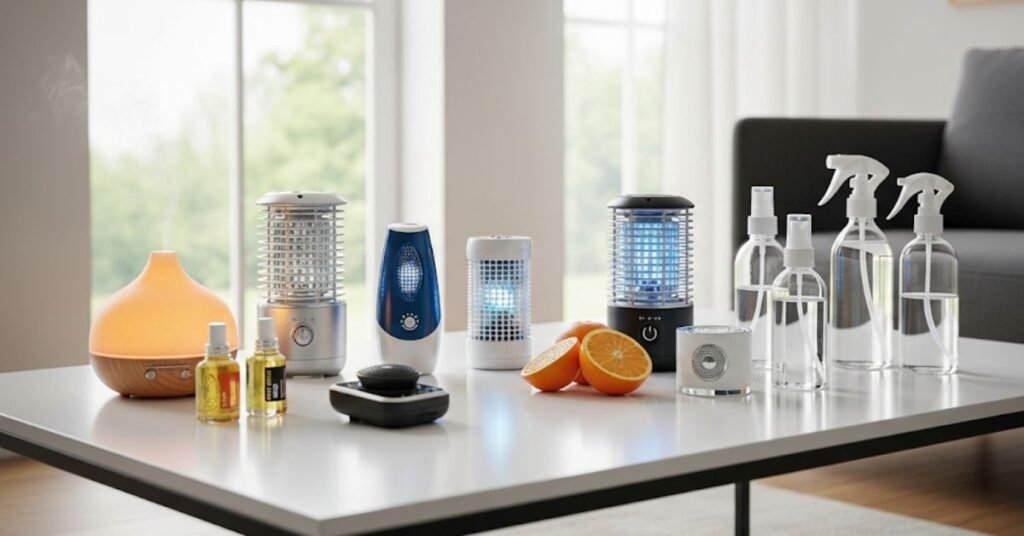Citronella candles are a popular choice for keeping pesky insects at bay, especially during outdoor gatherings. Their distinctive lemony scent is synonymous with summer evenings and bug-free zones.
However, a common question arises: can you safely burn citronella candles indoors? While the answer isn’t a simple yes or no, the general recommendation from experts is to exercise extreme caution, and in most cases, avoid it altogether.
This comprehensive guide will delve into the science behind citronella candles, explore the potential risks of indoor use, and provide safer, more effective alternatives for a comfortable, bug-free indoor environment.
Understanding Citronella: More Than Just a Scent
Citronella oil is a natural insect repellent derived from the Cymbopogon (lemongrass) plant. It works by masking the scents that attract mosquitoes and other insects, effectively making it harder for them to locate their targets.
When incorporated into candles, the burning process releases this oil into the air, creating a protective barrier.
While citronella itself is generally considered non-toxic to humans and pets in small, diluted amounts, the act of burning any candle indoors introduces a different set of considerations.

The Risks of Burning Citronella Candles Indoors
Despite their effectiveness outdoors, burning citronella candles inside your home can pose several risks, primarily due to the combustion process and the concentration of the emitted substances in enclosed spaces. It’s crucial to understand these potential hazards before deciding to light one up indoors.
1. Compromised Indoor Air Quality
All candles, when burned, release particulate matter, soot, and various combustion byproducts into the air. Citronella candles, in particular, are known to produce more smoke and soot than standard candles. In an enclosed indoor environment, these airborne particles can quickly accumulate, leading to:
- Respiratory Irritation: Fine particulate matter can irritate the lungs and respiratory system, potentially exacerbating conditions like asthma, allergies, and bronchitis. Sensitive individuals, young children, and the elderly are particularly vulnerable.
- Carbon Monoxide: In poorly ventilated areas, burning candles can lead to an increase in carbon monoxide (CO) levels. While typically not a significant concern with a single candle in a well-ventilated space, prolonged burning or multiple candles can elevate CO to dangerous levels, leading to headaches, dizziness, nausea, and in severe cases, carbon monoxide poisoning.
- Soot and Residue Buildup: The increased soot production from citronella candles can leave a visible residue on walls, ceilings, furniture, and even electronic devices. This not only creates a cleaning challenge but can also indicate poor indoor air quality.
2. Strong Scent and Potential for Allergic Reactions
The strong, distinctive scent of citronella, while pleasant to some, can be overwhelming in an enclosed space. For individuals with fragrance sensitivities, this can trigger:
- Headaches and Nausea: The concentrated aroma can cause discomfort, leading to headaches or feelings of nausea.
- Allergic Reactions: Some individuals may experience allergic reactions, such as skin irritation, watery eyes, or respiratory distress, when exposed to high concentrations of citronella oil or its combustion byproducts.
3. Pet Safety Concerns
Our furry friends are often more sensitive to airborne irritants and strong scents than humans. Burning citronella candles indoors can pose risks to pets, including:
- Respiratory Issues: Pets, especially those with pre-existing respiratory conditions, can suffer from irritated airways due to smoke and particulate matter.
- Ingestion Risk: Curious pets might attempt to chew on or ingest candle wax, which can lead to digestive upset or more severe health issues depending on the ingredients.
- Fire Hazard: Pets can accidentally knock over burning candles, leading to a fire hazard.
4. Limited Effectiveness Indoors
Citronella candles are designed to be most effective in open, outdoor environments where their smoke and scent can disperse freely, creating a localized bug-free zone. Indoors, their effectiveness as an insect repellent is significantly diminished.
Mosquitoes and other insects are less likely to be a major problem inside a sealed home, and the limited air circulation can actually concentrate the very elements (smoke, soot) that make them unsuitable for indoor use. For indoor pest control, more targeted and safer methods are available.

When to Use Citronella Candles (and How to Do It Safely)
Given the potential risks, citronella candles are best reserved for their intended purpose: outdoor use. They are excellent for patios, decks, and backyard gatherings where fresh air can dissipate the smoke and scent.
If you absolutely must use them indoors, perhaps for a very short duration in a specific, well-ventilated area, follow these strict precautions:
- Ensure Ample Ventilation: Open windows and doors to create a cross-breeze. Use fans to circulate air and help disperse any smoke or scent.
- Limit Burning Time: Do not burn citronella candles for extended periods indoors. Short durations (e.g., 30 minutes to an hour) are preferable.
- Maintain Distance: Keep candles away from sensitive individuals, children, and pets. Ensure they are placed on a stable, heat-resistant surface, far from flammable materials.
- Never Leave Unattended: Always keep a burning candle within sight. Extinguish it before leaving the room or going to sleep.
- Consider Candle Size: Smaller candles will produce less smoke and scent than larger ones. Opt for smaller sizes if indoor use is unavoidable.
Safer and More Effective Indoor Alternatives
For a truly bug-free and healthy indoor environment, consider these alternatives that are specifically designed for indoor use and pose fewer risks:
| Alternative | Benefits | Considerations |
| Essential Oil Diffusers | Uses natural essential oils (e.g., lavender, lemongrass, peppermint, eucalyptus) to repel insects. No combustion, smoke, or soot. Can also provide aromatherapy benefits. | Ensure oils are pet-safe if you have animals. Some oils can be toxic to pets if ingested or inhaled in high concentrations. |
| Window Screens & Sealed Entry Points | The most effective physical barrier against insects. Prevents them from entering your home in the first place. | Regularly check screens for tears and ensure doors and windows seal properly. |
| Indoor Insect Traps (e.g., UV light traps, sticky traps) | Attract and trap insects without chemicals or strong scents. | Placement is key for effectiveness. Requires regular cleaning or replacement. |
| EPA-Approved Indoor Insect Repellents | Products specifically formulated for indoor use, often containing active ingredients like picaridin or IR3535. | Always follow product instructions carefully. Ensure proper ventilation during and after application. |
| Natural Indoor Plants (e.g., Basil, Mint, Rosemary) | Some plants naturally deter insects with their scent. Can also add aesthetic value to your home. | Effectiveness as a sole repellent may be limited. Requires proper care and sunlight. |
The Expert Consensus: Prioritize Safety
The consensus among health and safety experts, as well as candle manufacturers, is clear: citronella candles are primarily for outdoor use. While the citronella oil itself is not classified as highly toxic by agencies like the EPA, the byproducts of combustion in an enclosed space present legitimate health and safety concerns.
The strong scent, increased soot, and potential for respiratory irritation make them a less-than-ideal choice for indoor environments.

For a truly safe and effective approach to indoor insect control, embrace alternatives that are designed with indoor air quality and occupant well-being in mind. Your health, and the health of your family and pets, should always be the top priority.
For more comprehensive information on candle care and usage, including tips for various types of candles, be sure to visit Bath and Body Works Candles.
Frequently Asked Questions (FAQs)
Is it harmful to burn citronella candles indoors?
Yes, it can be harmful. While citronella oil itself is not highly toxic, burning citronella candles indoors releases more smoke, soot, and particulate matter than regular candles.
This can lead to poor indoor air quality, respiratory irritation, and in poorly ventilated spaces, an increase in carbon monoxide levels. It’s generally not recommended for prolonged use.
Why do citronella candles have warnings for outdoor use only?
Manufacturers and safety organizations recommend outdoor use because the candles are designed to disperse their insect-repelling properties in open air.
Indoors, the smoke, soot, and strong scent can become concentrated, leading to health concerns and potential mess. The warnings are in place to ensure the product is used safely and effectively as intended.
Do citronella candles actually work indoors to repel mosquitoes?
Their effectiveness indoors is significantly limited. Citronella candles rely on the dispersion of their scent and smoke to deter insects, which is less impactful in enclosed spaces.
For indoor mosquito control, physical barriers like screens or targeted indoor repellents are far more effective and safer.
Are there any safe ways to use citronella candles indoors?
If you absolutely must use them indoors, ensure the area is extremely well-ventilated by opening windows and using fans.
Limit the burning time to short durations, keep them away from sensitive individuals and pets, and never leave them unattended. However, safer alternatives are always recommended for indoor insect control.
What are the best alternatives to citronella candles for indoor insect control?
Excellent indoor alternatives include essential oil diffusers (using pet-safe oils like lavender or lemongrass), ensuring intact window screens and sealed entry points, using indoor insect traps (e.g., UV light traps), and EPA-approved indoor insect repellents designed for enclosed spaces.
These options provide effective insect control without compromising indoor air quality or posing health risks associated with candle combustion.
What are the best alternatives to citronella candles for indoor insect control?
Excellent indoor alternatives include essential oil diffusers (using pet-safe oils like lavender or lemongrass), ensuring intact window screens and sealed entry points, using indoor insect traps (e.g., UV light traps), and EPA-approved indoor insect repellents designed for enclosed spaces.
These options provide effective insect control without compromising indoor air quality or posing health risks associated with candle combustion.